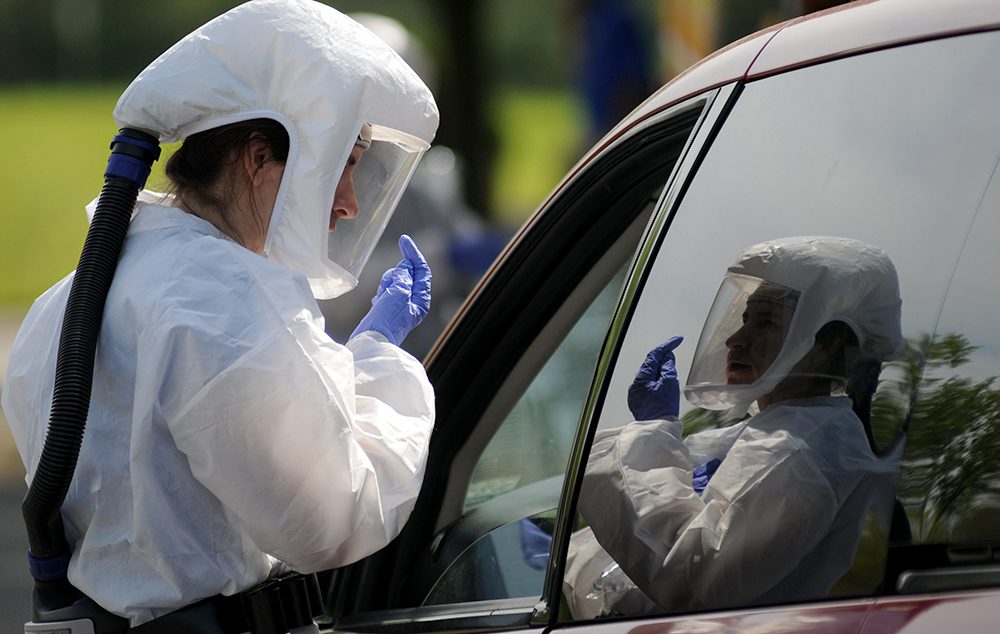Diagnostic vs. Antibody Tests

NOTE: This COVID-19 post is over a year old and may contain outdated information. It has been left up for archival purposes only. For the most up-to-date information on masking, vaccines, and more, visit the CDC’s website.
There are two main types of tests:
- Diagnostic tests: Swab tests used to identify whether someone currently has COVID-19
- Antibody tests (also called serology tests): blood tests used to identify whether someone had COVID-19 at some point in the past
Diagnostic Tests for Current Infection
How are diagnostic tests performed?
Diagnostic tests are performed by inserting a long swab into one’s nose or throat. Usually, the swab sample needs to be sent to a lab, though some can be run in a healthcare provider’s office. Labs aim to return results within 24 to 72 hours, however, a shortage in testing reagents is causing delays. If you have symptoms of COVID-19 or have been in direct contact with a COVID-19 positive individual, you should stay home while waiting for your test results. If you are positive you should continue to do so. Find guidance on when it is safe to discontinue home isolation here.
Who should get a COVID-19 diagnostic test?
It is important to get tested if:
- You have symptoms of COVID-19
- Were in close contact with someone who was diagnosed with COVID-19 or had symptoms of COVID-19 (were closer than less than 6 feet for 15 minutes or more)
- Were recently at a large gathering
- Are planning to visit someone at high risk of severe illness
- Live or work in a group residential setting (such as a nursing home)
- Work in healthcare or have a job that involves regular close contact with others.
To find a testing site, visit jcph.org/events.
What does a positive diagnostic test result mean?
A positive test result means that you presently have COVID-19 and should stay home and take precautions to reduce the risk of spreading the virus. Find information about what to do when you are sick here.
What does a negative diagnostic test result mean?
A negative test result means that you do not presently have COVID-19. You should continue to practice preventive measures such as wearing a mask, social distancing, and practicing hand hygiene. These preventive measures are especially important if you have symptoms, because the virus can show up at any time within the 14 day incubation period.
Antibody Tests for Past Infection
Antibodies are special proteins that the body produces to help fight off infections. It generally takes some time after infection for antibodies to be produced and detectable in the blood. Sometimes antibodies protect us from getting the same infection again, but we do not yet know if antibodies prevent repeat COVID-19 infection.
What is the purpose of COVID-19 antibody testing?
Antibody testing can help us better understand COVID-19, including how the body responds to the virus and how often the virus causes an infection with symptoms. It can also help us estimate how many people have had COVID-19. These tests are important for public health, but hard to interpret for personal health because we do not yet know if antibodies provide COVID-19 immunity.
Who can get an antibody test
Antibodies take time to develop, so antibody testing will not be accurate for someone who is or was recently sick. Antibody testing should not be performed if an individual has COVID-19 symptoms, had COVID-19 symptoms in the last two weeks, or has a positive diagnostic test for COVID-19 in the last two weeks.
How are antibody tests performed?
Antibody tests require a blood sample through a finger stick or blood draw. The sample is then sent to a lab.
What does a positive antibody test result mean?
A positive test result means that antibodies were detected in your blood and that you likely had COVID-19 at some point in the past. However, it is also possible you did not have COVID-19 and the antibodies detected were from an infection with a related virus. This is called a false positive. Because of the chance of false positives with antibody testing, the health department does not provide them. We also do not count antibody results in our case counts.
If I test positive, does that mean I’m immune to COVID-19?
It is not yet known whether antibodies developed in response to COVID-19 protect us from getting it again or how long that immunity lasts. It’s important to continue to practice preventative measures even if you test positive for antibodies.
What does a negative antibody test result mean?
A negative test result means that antibodies were not detected in your blood and you most likely 1) have not had COVID-19 OR 2) you had it but:
- There has not been enough time for antibodies to develop or
- Your body did not produce enough antibodies for the test to be able to detect them or
- There were problems with the accuracy of the antibody test that was used
If I test positive for antibodies, do I need to worry about being around others anymore?
A positive test result means you likely had COVID-19 at some point in the past. However, we still do not know yet if you can get COVID-19 again.
The Jackson County Health Department may change recommendations as the situation evolves.
Archives
- July 2025 (1)
- June 2025 (3)
- April 2025 (2)
- February 2025 (1)
- January 2025 (2)
- December 2024 (1)
- September 2024 (2)
- August 2024 (2)
- July 2024 (1)
- June 2024 (1)
- February 2024 (1)
- July 2023 (1)
- March 2023 (1)
- October 2022 (1)
- September 2022 (1)
- August 2022 (1)
- July 2022 (2)
- June 2022 (2)
- May 2022 (1)
- April 2022 (4)
- March 2022 (1)
- February 2022 (1)
- January 2022 (2)
- December 2021 (4)
- November 2021 (3)
- September 2021 (2)
- August 2021 (3)
- July 2021 (2)
- June 2021 (1)
- May 2021 (2)
- March 2021 (1)
- December 2020 (6)
- November 2020 (8)
- October 2020 (4)
- September 2020 (7)
- August 2020 (3)
- July 2020 (11)
- May 2020 (2)
- April 2020 (4)
- March 2020 (1)
Categories
- Communicable Disease (4)
- Clinical Services (18)
- Clinical Servcies (1)
- Health Promotions (72)
- Emergency Preparedness (8)





